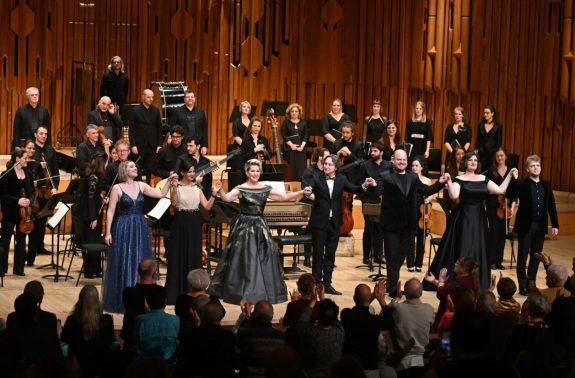 United Kingdom Carissimi’s Jephte and Purcell’s Dido and Aeneas: Soloists, Choir and Orchestra of Il Pomo d’Oro / Maxim Emelyanychev (harpsichord and conductor). Barbican Hall, London, 2.2.2024, (AK)
United Kingdom Carissimi’s Jephte and Purcell’s Dido and Aeneas: Soloists, Choir and Orchestra of Il Pomo d’Oro / Maxim Emelyanychev (harpsichord and conductor). Barbican Hall, London, 2.2.2024, (AK)

Cast of Jephte:
Jephte – Andrew Staples
Daughter – Carlotta Colombo
Narration – various chorus members
Cast of Dido and Aeneas:
Dido – Joyce DiDonato
Aeneas – Andrew Staples
Belinda – Fatma Said
Sorceress – Beth Taylor
Second woman – Carlotta Colombo
Spirit – Hugh Cutting
Sailor – Massimo Altieri
First Enchantress – Alena Dantcheva
Second Enchantress – Anna Piroli
Heavily advertised as Dido and Aeneas with Joyce DiDonato in the lead, Giacomo Carissimi’s Jephte in the first half seems to have been designed to take a very modest secondary place at the excellent Barbican Hall concert. Even the programme notes, both digital and hard copy, were titled only as Dido and Aeneas. Yet Carissimi’s oratorio was a perfect choice to accompany Henry Purcell’s opera. Composed approximately thirty-forty years apart (Jephte in Rome in 1650, Dido in London in the 1680s), both tell the story of arguably gullible men and the consequent downfall (death) of women, and both pieces conclude with beautiful laments.

For me the most remarkable performance of the double-show was that by Andrew Staples as Jephte. Clearly fully aware of what we can be confident of regarding as early music practices, Staples delivered Jephte’s foolish tragedy with self-effacing modesty, with nuanced changes in musical tone colour, dynamics, and diction. The beauty of Staples’s dignified presentation was a marvel to behold.
Carissimi deals with the biblical story of the Israelite general Jephte who wows that in exchange for being victorious over the Ammonites he will sacrifice the first creature he meets after victory …tragically this creature turns out to be his beloved daughter.
As far as I can ascertain from surviving sources – the personal copy of Marc Antoine Charpentier (1643-1704) as the original manuscript is presumed to be lost – Carissimi composed Jephte for three solo voices, a chorus of six voices and a bass continuo. Here at the Barbican, we had an orchestra of eleven players (including conductor/harpsichord player Maxim Emelyanychev) and a chorus of eighteen. I hasten to add that the Il Pomo d’Oro orchestra and choir were excellent, they spoke baroque musical language. Nevertheless, it would have been nice to be informed as to where the orchestral arrangement comes from: there is no information about it in the programme notes.
I can speculate that, owing to the size of the Barbican, the eighteen chorus members simply tripled Carissimi’s chorus of six …but where did the violins come from? More importantly, what was the relatively long orchestral piece opening the performance? Surviving sources start with the solo narration: there is no orchestral introduction.
Over the years I have been privileged to enjoy wonderful performances by Joyce DiDonato. My fondest memory is her delivery of Rosina (of Rossini’s Il barbieri di Siviglia) in a wheelchair after she had some significant injury. Her stagecraft was such that one wondered if the part should always be delivered in a wheelchair. Her faultless singing was exemplary.
Having greatly enjoyed DiDonato’s virtuoso Agrippina four years ago (see Seen and Heard review here), I was very much looking forward to her Dido this time.
Four years ago, I wrote: ‘She fully inhabits the taxing part of Agrippina which she delivers with virtuosity both vocally and dramatically. DiDonato’s energy and resources seem endless, her evident joy of being on stage is infectious, and her communication with the audience is ever present, whether by clear action or subtle gestures.’
This time I was somewhat disappointed. DiDonato remains in full command of her artistry and applies a vast range of vocal tone colours and dynamics. But the performance was about her, not about Dido. Her fans loved it, they gave her a huge ovation already when she entered the stage before the performance of Dido and Aeneas. After the great lament DiDonato stayed on stage, standing in full light while the chorus sang about her demise. The staging concluded with sudden darkening the stage, showing only DiDonato still in full light standing there. Was this about Dido who died about ten minutes earlier or about a great diva of our times?
The whole of Dido and Aeneas was beautifully rendered. Four years ago, I was concerned about conductor Maxim Emelyanychev’s approach to baroque music but not this time. Dramatically I was not convinced about the chorus trying to turn into a band of rowdy sailors with practically no stage space at their disposal, but the rest of the staging/dramatic interpretation was fully credible and enjoyable.
Andrew Staples presented a dignified Aeneas, Fatma Said was near perfection as Belinda, Beth Taylor inhabited the part of sorceress with natural ease and crystal-clear diction while her fellow conspirators Alena Dantcheva and Anna Piroli added credible extra dimension to the cruel plot. All these solo singers as well as those from the chorus sang beautifully.
On balance, this was excellent programming and highly enjoyable. I would see and hear it again.
Agnes Kory
Featured Image: Performers of Dido and Aeneas © Mark Allan/Barbican
